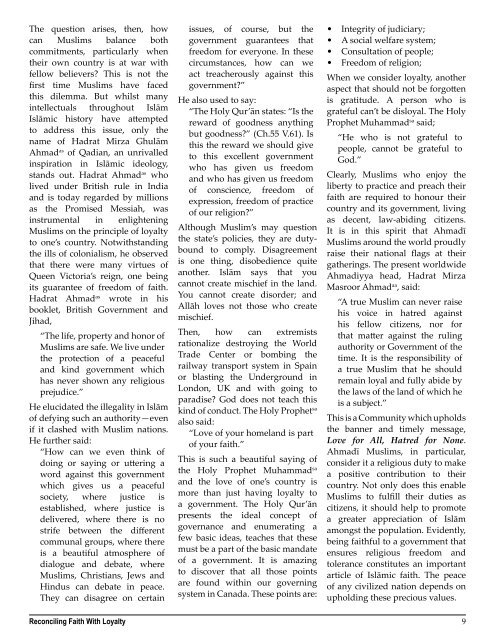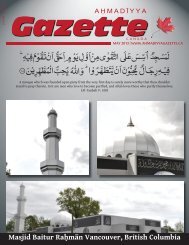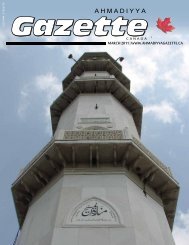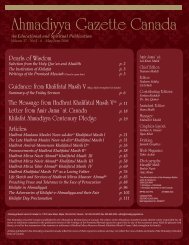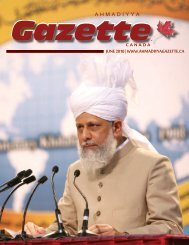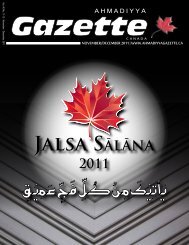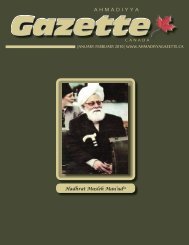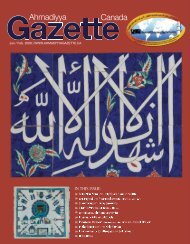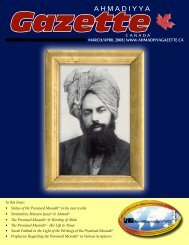English PDF - Ahmadiyya Gazette Canada
English PDF - Ahmadiyya Gazette Canada
English PDF - Ahmadiyya Gazette Canada
Create successful ePaper yourself
Turn your PDF publications into a flip-book with our unique Google optimized e-Paper software.
The question arises, then, how<br />
can Muslims balance both<br />
commitments, particularly when<br />
their own country is at war with<br />
fellow believers? This is not the<br />
first time Muslims have faced<br />
this dilemma. But whilst many<br />
intellectuals throughout Islām<br />
Islāmic history have attempted<br />
to address this issue, only the<br />
name of Hadrat Mirza Ghulām<br />
Ahmad as of Qadian, an unrivalled<br />
inspiration in Islāmic ideology,<br />
stands out. Hadrat Ahmad as who<br />
lived under British rule in India<br />
and is today regarded by millions<br />
as the Promised Messiah, was<br />
instrumental in enlightening<br />
Muslims on the principle of loyalty<br />
to one’s country. Notwithstanding<br />
the ills of colonialism, he observed<br />
that there were many virtues of<br />
Queen Victoria’s reign, one being<br />
its guarantee of freedom of faith.<br />
Hadrat Ahmad as wrote in his<br />
booklet, British Government and<br />
Jihad,<br />
“The life, property and honor of<br />
Muslims are safe. We live under<br />
the protection of a peaceful<br />
and kind government which<br />
has never shown any religious<br />
prejudice.”<br />
He elucidated the illegality in Islām<br />
of defying such an authority—even<br />
if it clashed with Muslim nations.<br />
He further said:<br />
“How can we even think of<br />
doing or saying or uttering a<br />
word against this government<br />
which gives us a peaceful<br />
society, where justice is<br />
established, where justice is<br />
delivered, where there is no<br />
strife between the different<br />
communal groups, where there<br />
is a beautiful atmosphere of<br />
dialogue and debate, where<br />
Muslims, Christians, Jews and<br />
Hindus can debate in peace.<br />
They can disagree on certain<br />
issues, of course, but the<br />
government guarantees that<br />
freedom for everyone. In these<br />
circumstances, how can we<br />
act treacherously against this<br />
government?”<br />
He also used to say:<br />
“The Holy Qur’ān states: “Is the<br />
reward of goodness anything<br />
but goodness?” (Ch.55 V.61). Is<br />
this the reward we should give<br />
to this excellent government<br />
who has given us freedom<br />
and who has given us freedom<br />
of conscience, freedom of<br />
expression, freedom of practice<br />
of our religion?”<br />
Although Muslim’s may question<br />
the state’s policies, they are dutybound<br />
to comply. Disagreement<br />
is one thing, disobedience quite<br />
another. Islām says that you<br />
cannot create mischief in the land.<br />
You cannot create disorder; and<br />
Allāh loves not those who create<br />
mischief.<br />
Then, how can extremists<br />
rationalize destroying the World<br />
Trade Center or bombing the<br />
railway transport system in Spain<br />
or blasting the Underground in<br />
London, UK and with going to<br />
paradise? God does not teach this<br />
kind of conduct. The Holy Prophet sa<br />
also said:<br />
“Love of your homeland is part<br />
of your faith.”<br />
This is such a beautiful saying of<br />
the Holy Prophet Muhammad sa<br />
and the love of one’s country is<br />
more than just having loyalty to<br />
a government. The Holy Qur’ān<br />
presents the ideal concept of<br />
governance and enumerating a<br />
few basic ideas, teaches that these<br />
must be a part of the basic mandate<br />
of a government. It is amazing<br />
to discover that all those points<br />
are found within our governing<br />
system in <strong>Canada</strong>. These points are:<br />
• Integrity of judiciary;<br />
• A social welfare system;<br />
• Consultation of people;<br />
• Freedom of religion;<br />
When we consider loyalty, another<br />
aspect that should not be forgotten<br />
is gratitude. A person who is<br />
grateful can’t be disloyal. The Holy<br />
Prophet Muhammad sa said;<br />
“He who is not grateful to<br />
people, cannot be grateful to<br />
God.”<br />
Clearly, Muslims who enjoy the<br />
liberty to practice and preach their<br />
faith are required to honour their<br />
country and its government, living<br />
as decent, law-abiding citizens.<br />
It is in this spirit that Ahmadī<br />
Muslims around the world proudly<br />
raise their national flags at their<br />
gatherings. The present worldwide<br />
<strong>Ahmadiyya</strong> head, Hadrat Mirza<br />
Masroor Ahmad aa , said:<br />
“A true Muslim can never raise<br />
his voice in hatred against<br />
his fellow citizens, nor for<br />
that matter against the ruling<br />
authority or Government of the<br />
time. It is the responsibility of<br />
a true Muslim that he should<br />
remain loyal and fully abide by<br />
the laws of the land of which he<br />
is a subject.”<br />
This is a Community which upholds<br />
the banner and timely message,<br />
Love for All, Hatred for None.<br />
Ahmadī Muslims, in particular,<br />
consider it a religious duty to make<br />
a positive contribution to their<br />
country. Not only does this enable<br />
Muslims to fulfill their duties as<br />
citizens, it should help to promote<br />
a greater appreciation of Islām<br />
amongst the population. Evidently,<br />
being faithful to a government that<br />
ensures religious freedom and<br />
tolerance constitutes an important<br />
article of Islāmic faith. The peace<br />
of any civilized nation depends on<br />
upholding these precious values.<br />
Reconciling Faith With Loyalty<br />
9


